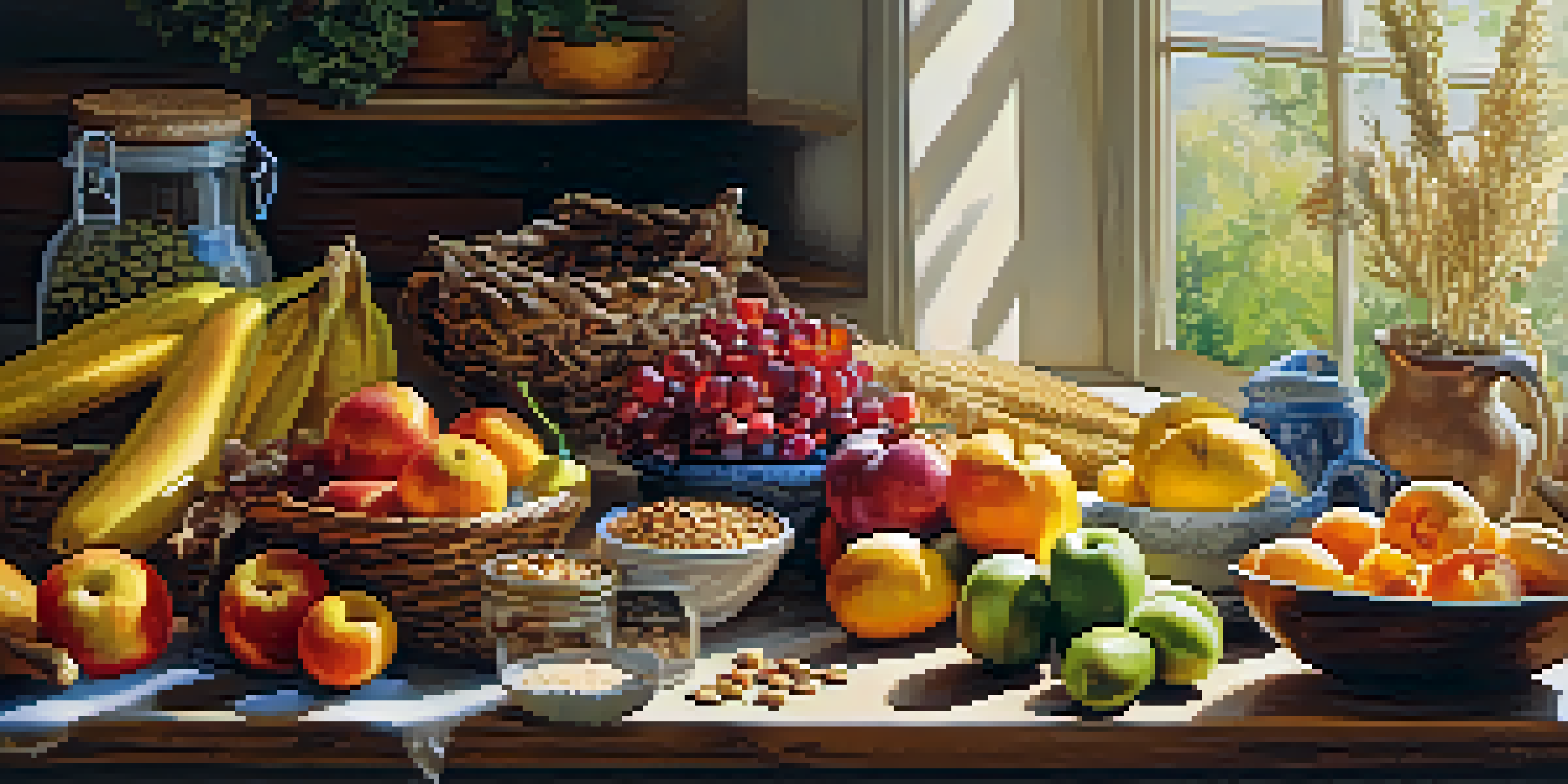How Fiber-Rich Vegetarian Diets Support Healthy Aging

Understanding the Role of Fiber in Our Diet
Fiber is a crucial component of a healthy diet, often found in fruits, vegetables, whole grains, and legumes. It plays a vital role in digestion and helps maintain a healthy gut. When we consume enough fiber, it keeps our digestive system running smoothly, which is essential as we age.
Let food be thy medicine and medicine be thy food.
There are two main types of fiber: soluble and insoluble. Soluble fiber dissolves in water and can help lower cholesterol levels, while insoluble fiber adds bulk to our stool, aiding in regularity. Both types are important for maintaining overall digestive health, especially as we grow older.
Incorporating fiber-rich foods into our meals can be as simple as adding beans to a salad or snacking on fruits and nuts. This not only enhances our meals but also supports our health in multiple ways, making fiber a key player in healthy aging.
Benefits of a Vegetarian Diet for Aging Gracefully
A vegetarian diet, rich in fiber, offers a plethora of health benefits that can support healthy aging. Research shows that individuals who follow vegetarian diets tend to have lower risks of chronic diseases such as heart disease, diabetes, and certain cancers. These benefits can be attributed to the abundance of nutrients found in plant-based foods.

Moreover, vegetarian diets are generally lower in saturated fats and calories, which can also assist in weight management. Maintaining a healthy weight is crucial for reducing the risk of age-related illnesses, allowing us to enjoy our golden years more actively.
Fiber Supports Healthy Aging
A fiber-rich vegetarian diet can significantly reduce the risk of chronic diseases and promote overall well-being as we age.
As we age, our bodies require different nutrients to function optimally. A fiber-rich vegetarian diet can provide essential vitamins and minerals while promoting a healthy lifestyle that encourages longevity and vitality.
How Fiber Supports Heart Health in Older Adults
Heart health becomes increasingly important as we age, and fiber plays a pivotal role in maintaining it. Studies indicate that diets high in fiber can help lower blood pressure and cholesterol levels, both critical factors in preventing heart disease. Incorporating fiber-rich foods into our daily meals can be a delicious way to protect our hearts.
You are what you eat, so don’t be fast, cheap, easy, or fake.
Fruits like apples and pears, along with legumes such as lentils and chickpeas, are excellent sources of fiber that can easily be added to our diets. By choosing these foods, we not only enhance our meals but also take proactive steps toward heart health.
Additionally, a fiber-rich vegetarian diet encourages regular physical activity, which is vital for heart health. When paired with exercise, a fiber-rich diet can significantly contribute to a healthier aging experience.
The Connection Between Fiber and Digestive Health
As we age, digestive health can often become a concern. Fiber is essential for maintaining regular bowel movements and preventing constipation, a common issue among older adults. A diet rich in fiber can help keep our digestive systems functioning properly, ensuring we feel our best.
Insoluble fiber, found in whole grains and vegetables, adds bulk to our stool, facilitating smoother digestion. Choosing fiber-rich foods can make a significant difference in our overall comfort and health as we age.
Fiber Enhances Digestive Health
Incorporating fiber into our meals helps maintain regular bowel movements and supports gut health, which is crucial for older adults.
Moreover, a healthy gut contributes to better nutrient absorption and can even affect our mood. By prioritizing fiber in our diets, we support not just our digestive health, but our overall well-being.
Weight Management and Its Importance for Seniors
Maintaining a healthy weight becomes increasingly crucial as we age, and fiber-rich vegetarian diets can be incredibly effective in this regard. High-fiber foods tend to be more filling, which can help curb overeating and support weight loss or maintenance. This is particularly important, as excess weight can lead to a host of age-related health issues.
Eating fiber-rich foods such as vegetables, whole grains, and legumes can help us feel satiated without consuming excess calories. This not only aids in weight management but also promotes a healthier lifestyle overall.
By adopting a fiber-rich vegetarian diet, seniors can take control of their weight, supporting their health and longevity in a way that allows them to enjoy life to the fullest.
The Role of Fiber in Blood Sugar Regulation
Blood sugar regulation is a critical aspect of health, especially for older adults who may be at risk for type 2 diabetes. Fiber plays an essential role in managing blood sugar levels by slowing the absorption of sugar into the bloodstream. This can help prevent spikes and crashes that can lead to fatigue and cravings.
Foods high in soluble fiber, like oats and beans, are particularly effective in stabilizing blood sugar levels. Incorporating these foods into our meals can be a simple yet powerful way to support our metabolic health.
Weight Management Through Fiber
High-fiber foods can aid in weight management by promoting satiety, helping seniors maintain a healthy weight and reduce age-related health risks.
By maintaining stable blood sugar levels through a fiber-rich vegetarian diet, seniors can enhance their energy levels and overall quality of life, allowing them to stay active and engaged.
Mindful Eating: Enjoying Fiber-Rich Foods
Mindful eating is an essential practice that encourages us to appreciate our meals and make healthier choices. When we focus on consuming fiber-rich vegetarian foods, we can savor the flavors and textures that come from nature's bounty. This not only enhances our dining experience but also promotes better digestion and satisfaction.
Taking the time to plan meals that include a variety of fiber-rich foods can make eating more enjoyable. Think of colorful salads, hearty vegetable soups, or grain bowls filled with quinoa and roasted veggies. Each meal presents an opportunity to nourish our bodies while indulging our taste buds.

By embracing mindful eating and prioritizing fiber, we can create a positive relationship with food that supports our health and well-being as we age.